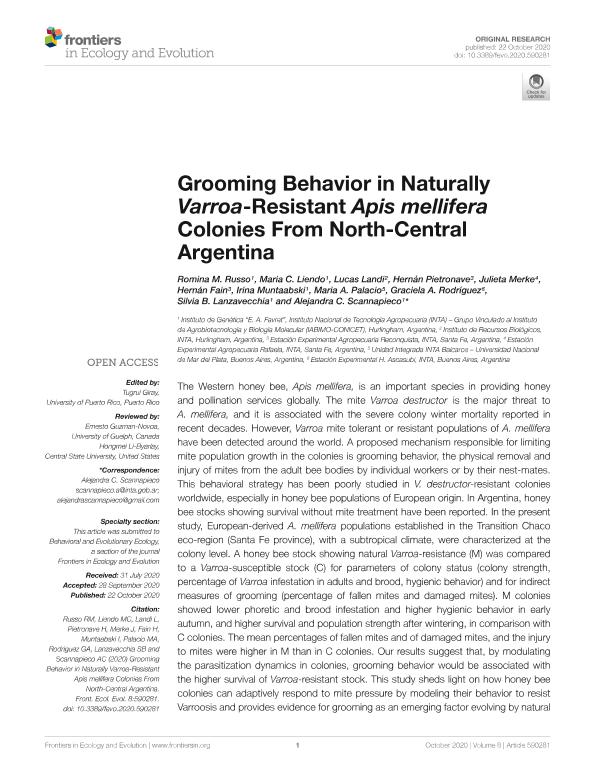Artículo
Grooming Behavior in Naturally Varroa-Resistant Apis mellifera Colonies From North-Central Argentina
Russo, Romina Maria; Liendo, María Clara ; Landi, Lucas; Pietronave, Hernán Pablo; Merke, Julieta; Fain, Hernan; Muntaabski, Irina
; Landi, Lucas; Pietronave, Hernán Pablo; Merke, Julieta; Fain, Hernan; Muntaabski, Irina ; Palacio, Maria Alejandra; Rodríguez, Ana Graciela; Lanzavecchia, Silvia Beatriz
; Palacio, Maria Alejandra; Rodríguez, Ana Graciela; Lanzavecchia, Silvia Beatriz ; Scannapieco, Alejandra Carla
; Scannapieco, Alejandra Carla
 ; Landi, Lucas; Pietronave, Hernán Pablo; Merke, Julieta; Fain, Hernan; Muntaabski, Irina
; Landi, Lucas; Pietronave, Hernán Pablo; Merke, Julieta; Fain, Hernan; Muntaabski, Irina ; Palacio, Maria Alejandra; Rodríguez, Ana Graciela; Lanzavecchia, Silvia Beatriz
; Palacio, Maria Alejandra; Rodríguez, Ana Graciela; Lanzavecchia, Silvia Beatriz ; Scannapieco, Alejandra Carla
; Scannapieco, Alejandra Carla
Fecha de publicación:
10/2020
Editorial:
Frontiers Media
Revista:
Frontiers in Ecology and Evolution
ISSN:
2296-701X
Idioma:
Inglés
Tipo de recurso:
Artículo publicado
Clasificación temática:
Resumen
The Western honey bee, Apis mellifera, is an important species in providing honey and pollination services globally. The mite Varroa destructor is the major threat to A. mellifera, and it is associated with the severe colony winter mortality reported in recent decades. However, Varroa mite tolerant or resistant populations of A. mellifera have been detected around the world. A proposed mechanism responsible for limiting mite population growth in the colonies is grooming behavior, the physical removal and injury of mites from the adult bee bodies by individual workers or by their nest-mates. This behavioral strategy has been poorly studied in V. destructor-resistant colonies worldwide, especially in honey bee populations of European origin. In Argentina, honey bee stocks showing survival without mite treatment have been reported. In the present study, European-derived A. mellifera populations established in the Transition Chaco eco-region (Santa Fe province), with a subtropical climate, were characterized at the colony level. A honey bee stock showing natural Varroa-resistance (M) was compared to a Varroa-susceptible stock (C) for parameters of colony status (colony strength, percentage of Varroa infestation in adults and brood, hygienic behavior) and for indirect measures of grooming (percentage of fallen mites and damaged mites). M colonies showed lower phoretic and brood infestation and higher hygienic behavior in early autumn, and higher survival and population strength after wintering, in comparison with C colonies. The mean percentages of fallen mites and of damaged mites, and the injury to mites were higher in M than in C colonies. Our results suggest that, by modulating the parasitization dynamics in colonies, grooming behavior would be associated with the higher survival of Varroa-resistant stock. This study sheds light on how honey bee colonies can adaptively respond to mite pressure by modeling their behavior to resist Varroosis and provides evidence for grooming as an emerging factor evolving by natural selection. Percentage of damaged mites appears to be a reliable measure to enhance this behavior in honey bee colonies by selective breeding. Finally, the importance of improving and protecting locally adapted honey bee populations with natural Varroa resistance for regional apiculture is discussed.
Archivos asociados
Licencia
Identificadores
Colecciones
Articulos (IABIMO)
Articulos de INSTITUTO DE AGROBIOTECNOLOGIA Y BIOLOGIA MOLECULAR
Articulos de INSTITUTO DE AGROBIOTECNOLOGIA Y BIOLOGIA MOLECULAR
Citación
Russo, Romina Maria; Liendo, María Clara; Landi, Lucas; Pietronave, Hernán Pablo; Merke, Julieta; et al.; Grooming Behavior in Naturally Varroa-Resistant Apis mellifera Colonies From North-Central Argentina; Frontiers Media; Frontiers in Ecology and Evolution; 8; 10-2020; 1-14
Compartir
Altmétricas



